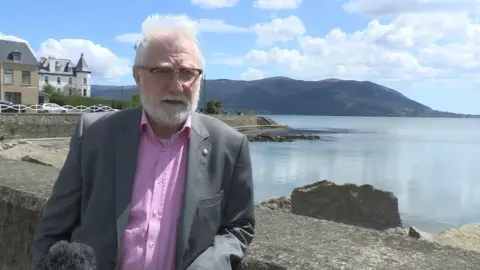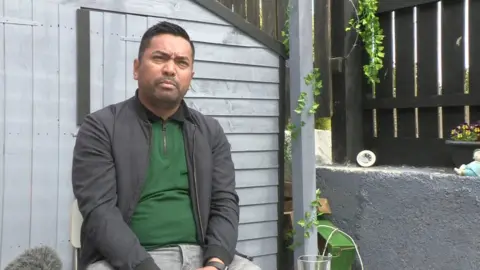Brexit: More than 86,000 in NI apply to EU settlement scheme
More than 86,000 people in Northern Ireland have applied to remain in the UK post-Brexit, according to official figures.
The settlement scheme is designed to give EU citizens - who entered the UK under the EU's freedom of movement principle - the right to remain.
Latest figures show that by the end of December, a decision had been reached on just over 80,000 applications.
More than 96% of those applicants were granted settled or pre-settled status.
The majority of those who have applied are from Poland, Lithuania and Romania.
'Wee bit annoyed'
Patrycja McMahon moved to Newry when she was a teenager.
She has married locally and owns her own beauty salon in the city, but despite laying down such deep roots, she is one of thousands of Polish nationals who have had to apply to stay in Northern Ireland.
"I was only 19 (when I moved to Newry), so I was a baby," she said.
"I didn't know the culture, I didn't know the history and, definitively, I didn't speak English.
"The actual process was quite easy and quick, but for someone who has been here for so many years - I'm married to an Irishman and my children are half-Irish; I'm paying my taxes - but I still had to go through that process.
"So I was a wee bit annoyed about that."


Settled status is granted to people who can prove they have been in the UK continuously for five years or more.
Those living in the UK for shorter periods can qualify for pre-settled status, which can be upgraded to settled status once the applicant has reached the five-year milestone.
The deadline for applications is the end of June.
The highest number of concluded applications in Northern Ireland have, so far, come from Polish people (24,810).
The next highest came from Lithuanian (12,400) and Romanian (10,070) nationals.
The lowest number of concluded applications are from Icelandic (20) and Maltese nationals (30).
There have been no applications from nationals of Luxembourg or Liechtenstein.
Applications have been concentrated in three local authority districts: Armagh, Banbridge, Craigavon (18,830), Belfast (17,010) and Mid Ulster (14,670).
Northern Ireland had a noticeably higher proportion (19%) of applications from people under-18 compared to other parts of the UK (15% in each nation).
There are separate arrangements for people from the Republic of Ireland, under the terms of the Common Travel Area.
People who hold Irish citizenship - including dual British and Irish citizenship - do not need to apply to the scheme.

For those who do not apply to the scheme, honorary Polish consul Jerome Mullen has a stark message.
"If they haven't achieved settled status by the end of June then they have no right to remain here."

Mr Mullen said that means they have no entitlements "to any particular benefits that they might be on" and "they really would be required to leave".
Outside the EU
About 5,000 people from East Timor live, mostly, in the Dungannon and Craigavon areas.
Many have Portuguese nationality, others are in Northern Ireland on East Timorese passports.
For this latter grouping, securing the right to stay is more complicated.
Theo Cardoso moved to Dungannon, County Tyrone, in 2003.
His first job was in a local meat factory.
Since then, he has moved to Lurgan, County Armagh, and now works as an interpreter.

He said most of the East Timorese community want to stay.
"Most of them have applied for pre-settled status and settled status, but with the East Timorese nationals, because it's non-EU it is a bit difficult.
"Some are just supported by an extended family member so it's harder to get pre-settled status because they have to get a residence card - otherwise they will go somewhere else, or down south (to the Republic of Ireland)."
It is factors like this that are concerning some businesses.
Paul McCann, who runs a recruitment consultancy in Dungannon, said some sectors were already experiencing pinch points in terms of attracting and keeping staff.

"Many of our clients, a good proportion of their workforces would be made up of EU nationals.
"Lithuanian, Polish and mostly Portuguese - and, of that, East Timorese who are coming in on Portuguese passports and they are working in the manufacturing, engineering and agri-food businesses.
"The fact that we as a business are having exponentially more enquiries in terms of new businesses asking us to help shows that, in the area, there is a major and growing concern as to where new talent is going to come from."
The deadline for applications to the EU settlement scheme is 30 June - after that we'll know its full impact.
